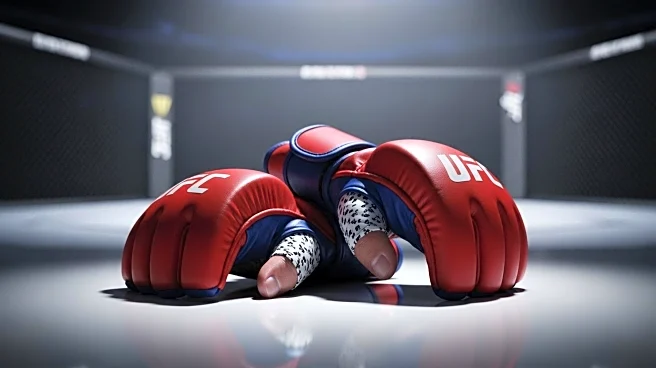What is the story about?
What's Happening?
Mario Pinto, a 27-year-old Portuguese heavyweight fighter, recently shared insights from his debut fight at UFC Rio. Despite feeling pressure and vulnerability as he entered the Octagon, Pinto acknowledged the importance of learning from both victories and losses. He emphasized the mental challenges faced during the fight, including the fear of making mistakes and the adrenaline rush that comes with high-stakes competition. Pinto's reflections highlight the psychological aspects of fighting, where the fear of error can be as significant as the physical challenges. His debut was marked by a strategic approach, using his jab to set up a decisive overhand right that ended the fight against Lane. Pinto's experience underscores the importance of mental resilience and adaptability in the sport.
Why It's Important?
Pinto's reflections are significant as they shed light on the mental and emotional aspects of professional fighting, which are often overshadowed by physical prowess. Understanding these elements is crucial for athletes, coaches, and sports psychologists who aim to enhance performance and well-being. Pinto's experience illustrates the broader challenges faced by fighters, including managing stress and expectations in high-pressure environments. This insight can contribute to better training methods and support systems for athletes, potentially improving their performance and career longevity. Additionally, Pinto's story resonates with fans and aspiring fighters, offering a candid look at the realities of competing at the highest level.
What's Next?
Mario Pinto is set to make his sophomore appearance against Jhonata Diniz at Farmasi Arena in Rio de Janeiro, Brazil. This upcoming fight presents an opportunity for Pinto to apply the lessons learned from his debut and further develop his skills. The fight will be closely watched by fans and analysts, eager to see how Pinto adapts and evolves in the Octagon. Success in this match could bolster his reputation and career prospects within the UFC, while a loss might offer additional learning experiences. The outcome will likely influence Pinto's future strategies and training focus.
Beyond the Headlines
Pinto's reflections highlight the broader cultural and psychological dimensions of combat sports. The emphasis on learning from both victories and defeats challenges the traditional narrative that losses are the primary source of growth. This perspective encourages a more holistic approach to athlete development, valuing every experience as a potential learning opportunity. It also raises ethical considerations about the pressures placed on fighters and the support systems needed to ensure their mental health and well-being. As the sport continues to evolve, these insights could lead to more comprehensive training programs that address both physical and psychological aspects.
















